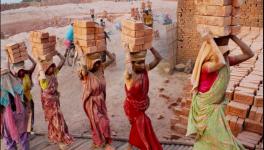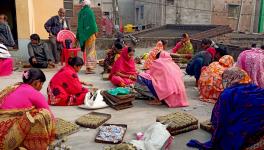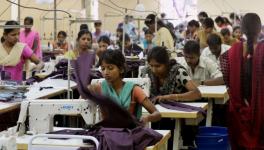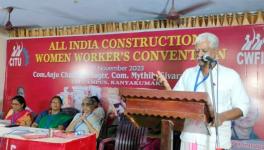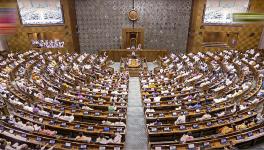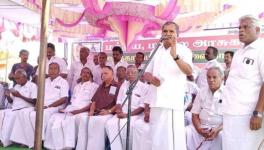In My Own Voice: Menstruation & Livelihood

Women's wall in Kerala.
As a girl I grew up in Delhi, studied on a scholarship to do my second post-graduate degree at Washington State University, and returned to what I thought would be to serve my people. It was the eighties and India was not globalised. We still had three kinds of cars on the road – the stodgy Ambassador, the slim-bodied Fiat and a still smaller, Standard Herald. One could cross the street easily and travel everywhere to do one’s work.
I travelled to Pararia in Bihar where the women had been gang-raped by the police which broke into their homes in uniform, to displace the entire village to make way for a dam. One was searching for the truth to record it and bring change. Call it naïve but that was the motivation.
Going to Ayodhya in Uttar Pradesh after the Babri Masjid was demolished was another momentous landmark. I could not believe that secular India was going to be destroyed in the manner it was; but then again one was simply finding facts with the belief that recording the truth as one could uncover it -- doing one’s duty – would bring justice.
Just once I did feel threatened when as part of a fact-finding team to Kandhamal in Odisha on the attack on the Christians, the entire team and I were surrounded by the villagers in a village where a pastor and his mother had been killed and the church destroyed. They blocked the car with stones and stood around with sticks and umbrellas. We escaped unhurt, when one of the team members prevailed upon them in Oriya – that we were peace seekers and were not looking for trouble.
India was a country that one could travel and engage with people peaceably – regardless of differences. Imagine, to my dismay, that when the Supreme Court majority judgement announced that women could not be stopped from entering the shrine, I saw so many women being threatened and hit. Then two women, Bindu and Kanakadurga, actually made it – a feat like climbing Mount Everest – and the shrine actually closed down for purification. This made me wince with shame!
Then the Congress member of Parliament, Shashi Tharoor, with all his urbane suavity, announced that it was ‘unnecessarily provocative’, so much for all his books and literary outpourings. Then, lo and behold, Prime Minister Narendra Modi, in an election speech in Kolam, Kerala, said that these were “matters of tradition”, and that the state government had no respect for religion or spirituality. He goes on to ask us to ponder on the dissenting judgement by Justice Indu Verma that the court should not intervene on matters of religion. So shall we then reinstate Sati and untouchability?
Backed by the rhetoric of political leaders and the grisly outrage of Brahmin priests, the mother in-law of the brave woman, Kanakadurga, actually beats her with a wooden plank when she returns home after two weeks of going incognito. Yes, the political always becomes personal on the minds, bodies and lives of women.
Frankly, never have the rights of women ever taken such a beating in free India. The fact that menstruation itself is considered dirty or polluting but giving birth to children is not, is something we need to discuss. Women in the menstruating age will entice Lord Ayappa who is celibate; for god’s sake, do women have nothing better to do than to entice deities?
And, surely, we can deal with menstruation as women fly planes, go into space and do back-breaking work on construction sites and in the fields. But we are being pushed back into the four walls of the home to do the dirty work: cook, clean, pack tiffins as men go in search of work. In the 1.2 crore jobs lost last year, 88 million were women. Women’s pain is traumatic because several of them are forced into trafficking and demeaning prostitution to feed their kids.
Why are women not going on strike to demand work with wages? Because we have not been conscientised to think of ourselves as a unit. The participation of female labour has declined from 34.80% in 1990 to 23.70% in 2016. This is the post-liberalisation period, so while we invite the world to ‘Make in India’ and go up in our ‘ease to do business’ rank, we take away jobs from women. According to Mahesh Vyas of the Centre for Monitoring Indian Economy, “women suffer when there is an employment problem and there are only 27% in the labour force”. So, even though female enrolment in education has gone up and normally education should lead to jobs, but not in India.
These are amazing figures. While we are denied equality and our livelihoods, we are expected to vote for patriarchy and a system that is making women indigent, helpless, poverty-stricken and dependent on their menfolk. Meanwhile, Minister Prakash Javadekar made an astounding statement, that women don’t really want jobs. Indeed, give up your salary and the perks, Mr Javadekar; just hand it over.
It is time women voted as a block for those who represent their rights in reality and wave a red menstrual soaked rag in front of those who block our way towards our jobs and our freedom.
(Sagari Chhabra is an award-winning writer & filmmaker)
Get the latest reports & analysis with people's perspective on Protests, movements & deep analytical videos, discussions of the current affairs in your Telegram app. Subscribe to NewsClick's Telegram channel & get Real-Time updates on stories, as they get published on our website.









